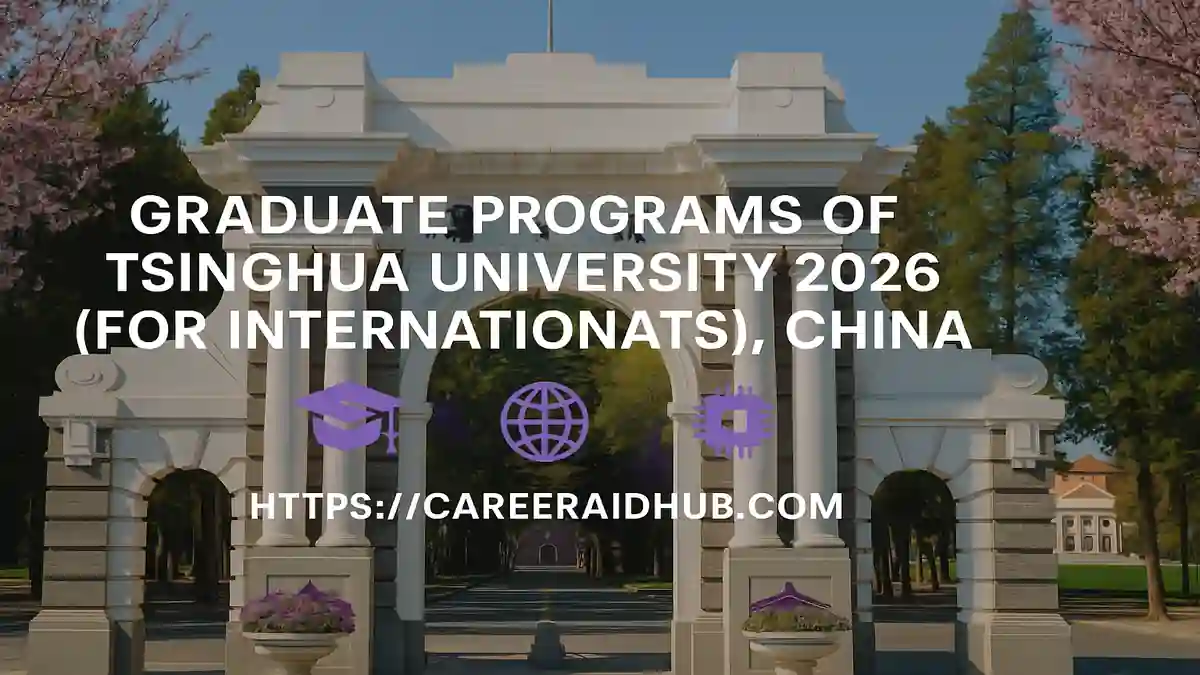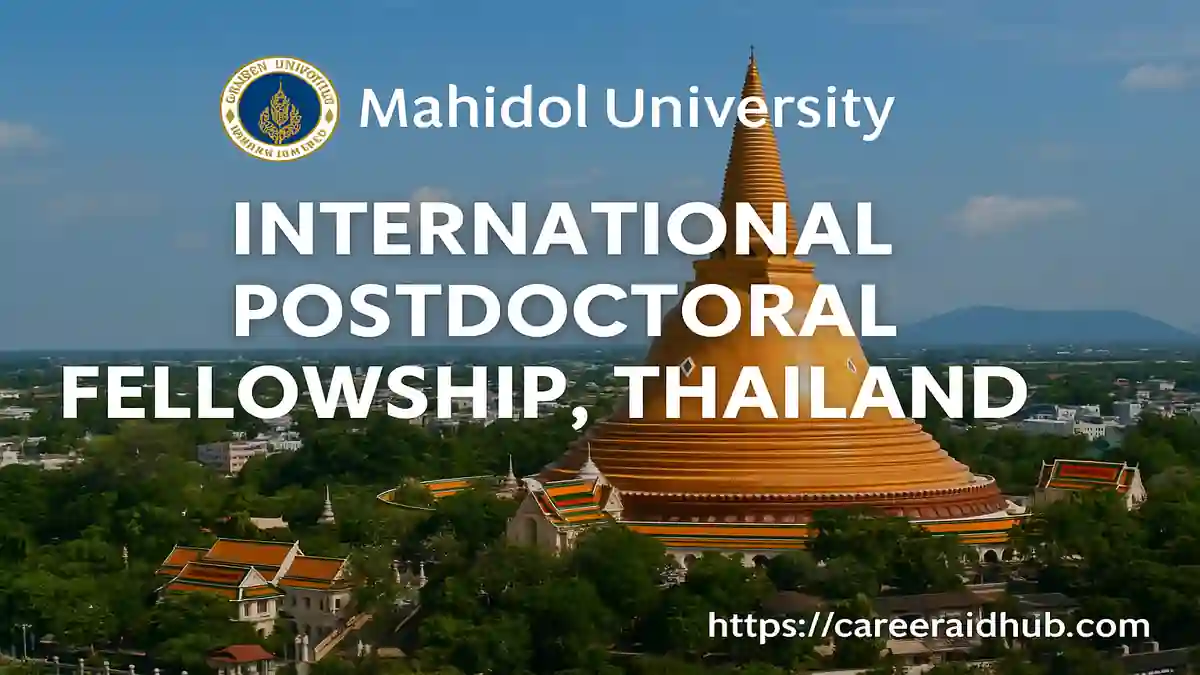Introduction
Tsinghua University (THU) offers a comprehensive graduate admission pathway for international students, combining academic depth with industry and policy engagement in Beijing and Shenzhen. Applications are centralized through a dedicated online portal, and policies are published transparently for each program, which helps candidates plan early and apply efficiently.
Tsinghua University opens a structured route into China’s top research ecosystem. International applicants will find broad degree options, English-taught programs, competitive scholarships, and a clear, portal-based application. This guide explains eligibility, batches, required documents, costs, funding, and arrival logistics so you can plan and submit a strong application with confidence.
Why Tsinghua for graduate school
Academic reputation and ecosystem access
Tsinghua is consistently ranked among the world’s leading universities. In addition to rigorous training, students benefit from proximity to national laboratories, technology parks, and policy institutes. Consequently, research flows naturally into pilot projects, internships, and translational opportunities.
English-taught pathways and cross-disciplinary study
The university lists numerous English-medium master’s and doctoral options, especially in Engineering, Computer Science, Architecture, Environmental Science, and Public Policy. Many schools also encourage cross-registration, allowing you to blend disciplinary depth with targeted electives in data science, design, or management.
Student services and research support
Beyond supervision, graduate students can access writing centers, high-performance
Program portfolio at a glance
Degrees and typical duration
International applicants may pursue Master’s and Doctoral degrees across the university. As a rule of thumb, master’s programs usually span two to three years, while doctorates typically require three to four years. A small number of candidates proceed directly to doctoral study after the bachelor’s degree based on exceptional preparation.
English-medium options and where to verify
Dozens of master’s and multiple doctoral programs are taught fully in English. Because listings change as departments update curricula, always verify availability, language of instruction, prerequisites, and contact details in the current Catalog of Graduate Programs and the Graduate Programs in English page linked from the portal.
Who is eligible
Citizenship and identity documentation
Applicants must be non-Chinese citizens holding an ordinary foreign passport. Additional documentation may be required for former Chinese nationals or applicants born abroad to Chinese parents; check the nationality notes carefully and prepare evidence of status changes where relevant.
Academic background and degree authentication
For a Master’s, you need a recognized Bachelor’s degree (or equivalent). For a Doctorate, you need a Master’s degree (or equivalent). Degree authentication is required by registration: CSCSE for overseas credentials and CHSI/CSSD for
Language competence
Each program sets its own Chinese or English proficiency thresholds (e.g., HSK or approved English tests). Exemptions may apply if your prior degree was taught in the target language. However, specific scholarships can require minimum HSK levels—read each listing’s “Remarks of Application.”
Health and conduct
Admitted students must meet university and national medical requirements and follow all THU and PRC regulations. Prepare to submit the standard physical examination form as part of visa processing.
Application timeline and batches
General window and rolling management
The main application season typically runs from September through February, with batch deadlines set by individual schools or departments. Because schedules vary, prioritize the catalog’s program-level notes over generic estimates.
Winter break considerations
During late January to late February, the online system remains open; however, document verification often proceeds more slowly. Therefore, plan to submit at least two to three weeks earlier to avoid delays.
Where and how to apply
All applications are submitted through the Tsinghua Online Application System. The university does not collaborate with intermediary agencies, so you should complete the process directly on the official
What to prepare: required materials
Core documents to upload
- Personal statement; doctoral applicants also outline research experience or a concise plan.
- Degree certificates plus authentication (CSCSE/CHSI as applicable). If authentication is pending, you may apply now but must complete it before registration.
- Official transcripts; include a GPA certification if the transcript lacks a cumulative GPA.
- Language test reports per program requirements.
- Two academic recommendation letters (from associate professors or above, or equivalent senior professionals).
- Passport bio page (ordinary passport).
- Program-specific materials if requested by your target department.
Formatting and translation guidance
Scan originals or notarized copies in color with a flatbed scanner. Avoid phone photos or scans of photocopies. Documents not in Chinese or English must be accompanied by certified translations submitted alongside the originals.
Fees and typical costs
Application fee
A non-refundable RMB 800 application fee is paid online at submission. Keep your receipt, as some schools may request proof during verification.
Tuition and budgeting
Tuition differs by school and program. Before finalizing your shortlist, review the official Tuition Fees of Graduate Programs for International Students for up-to-date figures and notes on laboratory, studio, or fieldwork charges where relevant.
Insurance and accommodation
International students purchase comprehensive insurance (commonly RMB 800 per year). On-campus housing is limited and allocated online; indicative Beijing campus rates are approximately RMB
Scholarships, assistantships, and awards
Major scholarship pathways
- Chinese Government Scholarship (CGS): Full or partial packages that may include tuition, campus dorm or housing subsidy, stipend, and medical insurance; benefits follow national policy and annual review.
- Tuition Scholarships (e.g., Beijing Government Scholarship, Tsinghua University Tuition Scholarship): Full or partial tuition support, generally awarded for one academic year with annual re-competition.
Assistantships and university honors
After enrollment, eligible students may apply for Teaching, Research, or Management assistantships—usually at the start of each semester. In addition, THU offers university-level awards for academic excellence and research impact.
Selection and offers
Holistic review and interview
Departments evaluate applications through document review and a comprehensive assessment, frequently including an interview. Panels examine research potential, academic fit, methodological skills, and communication. Following final decisions, the Admission Certificate is issued, and results appear in the application system.
Housing, visas, and arrival
Accommodation strategy
Because on-campus rooms are limited, reserve quickly during the online booking period. If you prefer more space or a particular neighborhood, begin off-campus searches early and review lease requirements in Beijing or Shenzhen.
Visa and registration sequence
Admitted students typically apply for the X1 student visa using the Admission Notice, JW201/JW202, and the Physical Examination Record (confirm your consulate’s checklist). After entry, convert the visa to a Residence Permit within 30 days. Registration is commonly scheduled for late August or early September.
Practical tips to strengthen your application
Follow the catalog, not assumptions
Program pages specify language scores, prerequisites, portfolios, and batch deadlines. Consequently, use each department’s Remarks of Application as your baseline and update your plan as new notices appear.
Authenticate early
If your degree authentication might take time, start immediately so CSCSE or CHSI paperwork is ready before registration. Missing this requirement can delay enrollment.
Plan around the winter break
Because verification slows during the break, submit earlier and monitor the portal for departmental messages, especially regarding interviews.
Prepare for interviews
Expect questions on research motivation, prior work, and methods. Bring concise talking points, a polished writing sample or portfolio, and a brief plan outlining your first year’s goals.
How to apply (checklist)
- Choose your program(s): Confirm fit, language, and batch deadlines in the current program catalog and the English-programs list.
- Create an account: Register on the Tsinghua Online Application System and select the correct intake and degree.
- Upload documents: Personal statement, degree certificates plus authentication, transcripts, language scores, two recommendations, passport page, and any program-specific items.
- Pay the fee: Settle the RMB 800 application fee online and save the confirmation.
- Track updates: Watch the portal for notices, interview invitations, and results.
- Plan funding: Apply for CGS or Tuition Scholarships; consider assistantships after enrollment.
- Arrange housing and visa: Reserve dorms if needed; prepare X1 visa documents and schedule the residence permit appointment.
Program Feature Summary
Feature | Details |
Program Name | Admission to Graduate Programs of Tsinghua University (For International Students) |
Host Country | China (Beijing; Shenzhen for SIGS) |
Funded By | Tsinghua University; Chinese Government Scholarship (CSC) and Beijing Government Scholarship for eligible students |
Duration | Master’s: typically 2–3 years; Doctoral: typically 3–4 years |
Study Mode | Full-time, on-campus |
Eligibility | Non-Chinese citizens with required degrees, language proficiency, health clearance, and complete documentation |
Financial Support | CGS packages; Tsinghua/Beijing tuition scholarships; assistantships after enrollment; university awards |
Fields of Study | Broad coverage across engineering, sciences, architecture, design, public policy, management, and more |
Deadline | Main cycle closes February — we will update soon; next expected cycle opens September — we will update soon |
Official Website | Click here |
Review & update timeline: audit this page every January, May, and September to refresh program listings, scholarship wording, and batch notices.
Conclusion
Tsinghua University provides a clear, policy-based route for international students to pursue master’s and doctoral study, supported by scholarships, assistantships, and coordinated arrival services. If you align your materials with program-level requirements, submit early, and plan around the winter break, the process is straightforward from portal submission to registration.
Frequently Asked Questions (FAQs)
Apply through the Tsinghua Online Application System; then upload required documents and pay the fee. Finally, monitor the portal for interview notices and results.
Yes. Many schools offer English-taught master’s and doctoral programs. However, confirm language of instruction on each program page before applying.
You must hold non-Chinese citizenship, possess the required degree, meet language standards, and satisfy health and conduct requirements. Additionally, submit complete, verifiable documentation.
Applications typically open in early autumn and close in late winter. However, departments may set batch deadlines, so always follow program-specific notices.
Requirements vary by program. Therefore, check each listing’s language section for minimum HSK or English test benchmarks and possible exemptions.
Prepare degree certificates, authentication proof, official transcripts, language scores, two recommendations, a personal statement, and your passport page. Additionally, submit any program-specific materials.
Yes. You may pursue Chinese Government Scholarship and tuition scholarships. Moreover, some students compete for assistantships after enrollment.
Yes. You must complete degree authentication through the designated agencies by registration. Consequently, start the process early to avoid delays.
Admitted students typically apply for the X1 student visa and then convert to a residence permit after arrival. Additionally, follow local consulate instructions.










